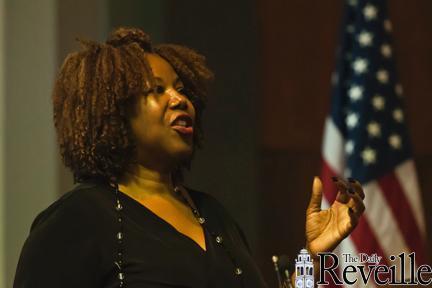The 6-year-old girl who inspired the nation spoke at the Paul M. Hebert Law Center nearly 52 years after she became the first child to attend an all-white school in the South. Civil rights icon Ruby Bridges, now 57, spoke to about 100 students on April 5 just before University students made the mass exodus of spring break.
Bridges described her first day at William Frantz Elementary in New Orleans’ Lower Ninth Ward in fall 1960. As a young child, Bridges said she was unaware of the significance of her trip to school.
“I was there getting dressed for my first day and thinking that everybody was so excited and that everyone came out because I was so smart, and I was on my way to college,” Bridges said. “If you don’t explain what is happening to a 6-year-old, they will use their imagination.”
But Bridges faced a much harsher reality.
The crowd gathered at Bridges’ house to escort her to school were there to protect her from the even larger mob that angrily protested her presence at the school.
Bridges said she learned later that her first trip to school was preceded by weeks of preparation by civil rights activists nationwide. The National Association for the Advancement of Colored People gathered a pool of 140 African-American children whose parents were willing to send them to white public schools in New Orleans.
Of those students, only six passed the test white administrators required the black students to take before they could enroll in public schools. Those six students were divided in half and sent to separate schools in what Bridges called the most racist parts of the city.
Bridges said that the two girls set to attend William Frantz Elementary with her dropped out two days before school began.
On her first day, Bridges climbed the steps to the school amid crowds of protestors only to sit in the principal’s office to wait for the end of the day.
The next day, the crowds doubled in size as locals learned which specific schools would integrate, Bridges said. Instead of going to the principal’s office, she continued to her classroom alone.
“I looked into the classroom and saw empty desks,” Bridges said. “I thought to myself, ‘My mom brought me to school too early.’ And indeed she had – years too early.”
For weeks Bridges attended school alone and was taught by Barbara Henry, a teacher from Boston hired specifically to teach her. Bridges described Henry as the “nicest teacher I ever had,” who filled her day with activities and games along with coursework.
“She made school fun,” Bridges said. “I never missed a day that whole year, and neither did she. She did everything she could to keep my mind off of what was happening outside.”
On the day she finally joined other students, Bridges was faced with racism from one of her classmates. A young boy used the N-word to explain that his mother had forbidden him to play with her.
It was at that moment that Bridges said she understood her situation.
“When he said that, I remember thinking, ‘So that is what this is about,'” Bridges said. “It is not Mardi Gras. I am not going to college. It is about me and the color of my skin.”
While her fellow students’ rejection disappointed Bridges, she said it did not anger her. In her youth, she understood that instructions from parents were not to be broken.
Bridges has since moved on to telling her story and teaching lessons of racial equality to schoolchildren across the country.
“They are so drawn to the story … because they put themselves in the shoes of this child,” Bridges said, referring to herself. “They understand the loneliness, but what they don’t understand is why that is happening to you, especially when it comes at the hands of an adult.”
Bridges said racism existed then and persists today, and it must be ended through the education of children. She closed by directly addressing the law students in attendance.
“You have a huge burden upon your shoulders. We have to have the right laws in place,” she said. “We are all expecting great things from you. We have got to turn this place around.”
____
Contact Paul Braun at pbraun@lsureveille.com
Civil rights icon Ruby Bridges visits campus
April 17, 2012

Ruby Bridges speaks April 5 to students about her struggle against racism at a young age.




